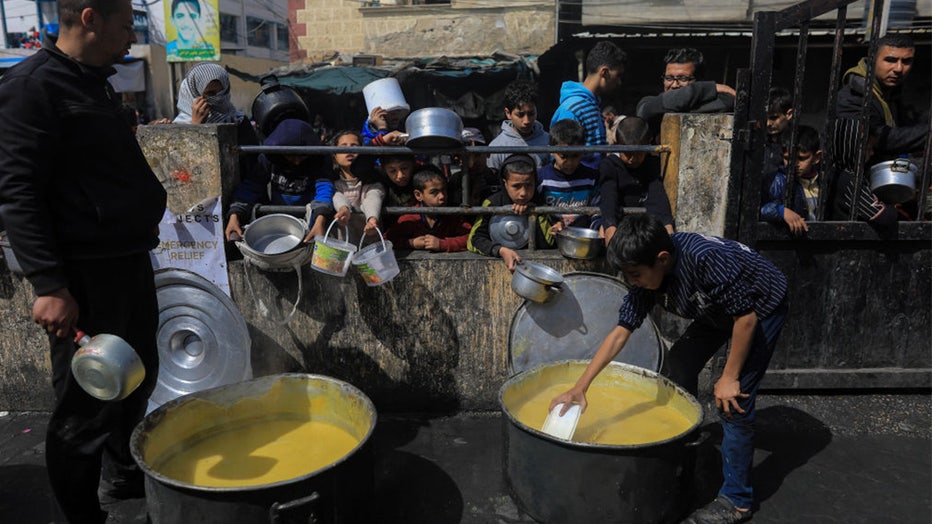US military will deploy temporary aid port on Gaza’s coast

U.S. military air drops more aid into Gaza
Former U.S. Central Command spokesperson Joe Buccino joins LiveNOW's Lexie Petrovic to discuss the recent air drops of aid into Gaza.
The U.S. military will deploy to set up a temporary port off the coast of Gaza, the Biden administration said Thursday, joining in an international push to open a sea route delivering food and other aid to desperate Palestinian civilians cut off by the Hamas-Israel war and by Israeli restrictions on humanitarian access by land.
The announcement signals further deepening of U.S. involvement in the war and the escalating conflicts and tensions in the region. The move also shows the Biden administration resorting to a highly unusual workaround to deliver aid to millions of civilians, in the face of restrictions that U.S. ally Israel has placed on overland aid deliveries.
RELATED: Gaza ceasefire: Israel has agreed to a framework, US says
Humanitarian crisis in Gaza
A widening humanitarian crisis across Gaza during five months of war has forced many people to scramble for food to survive.
In a meeting on the aid delivery crisis with Israel’s ambassador Michael Herzog, the U.S. international development director, Samantha Power, warned that blockaded Gaza "faced a real risk of famine," her office said Thursday.
Gaza’s Health Ministry said at least 30,717 Palestinians have been killed, this includes civilians and combatants, as the ministry does not differentiate between the two.
In its tallies, women and children make up two-thirds killed, according to the ministry.
Pressure on the Biden administration surged last week after Gaza health officials reported more than 100 people killed at an attempted aid delivery to the isolated north. Israel said its forces fired warning shots when the crowd began moving toward them. Witnesses and medical workers told The Associated Press that most of those injured were shot when Israeli forces fired into the crowds of hungry people.
Aid groups have said their efforts to deliver desperately needed supplies to Gaza have been badly hampered because of the difficulty of coordinating with the Israeli military, the ongoing hostilities and the breakdown of public order. It is even more difficult to get aid to the isolated north.

FILE - Displaced Palestinians gather to receive food at a donation point in Rafah in the southern Gaza Strip on March 07, 2024, after more than four months of ongoing battles between Israel and the militant group Hamas. (YASSER QUDIHE/Middle East Images/AFP via Getty Images)
The Biden administration's latest move provides one more layer to the extraordinary dynamic that’s emerged as the United States has had to go around Israel, its main Mideast ally, and find ways to get aid into Gaza, including through airdrops that started last week.
Gaza's humanitarian crisis is particularly dire in the north, where many of the estimated 300,000 people still living there have been reduced to eating animal fodder to survive. The U.N. says one in six children younger than 2 in the north suffers from acute malnutrition.
Possible floating pier
United States officials, who spoke with the Associated Press on the condition of anonymity to preview Biden’s announcement before his State of the Union speech, said the planned operation will not require American troops on the ground to build the pier that is intended to allow more shipments of food, medicine and other essential items from a port in the Mediterranean island country of Cyprus. They gave few other details, including on how many U.S. troops would take part.
One of the options under consideration is for the military to provide a floating pier called a JLOTS, or Joint Logistics-Over-the-Shore, one U.S. official said on the condition of anonymity to discuss the options before a decision has been made. The large floating pier allows supplies to be delivered without having a fixed port in place, alleviating the need to have troops on a dock on shore. Ships can sail to the pier, which is secured by anchors, and dock there.
Aid moving into the pier would likely be by commercial ship or contracted vessel, the official said.
Defense Department spokesman Maj. Gen. Pat Ryder said in a statement Thursday that U.S. officials and international partners were looking at options for the sea route, including using commercial companies and contractors.
The Associated Press contributed to this report. This story was reported from Los Angeles.

